This off-ramp won’t stay open for long. https://t.co/phx6ay4l9I
— Francis Fukuyama (@FukuyamaFrancis) October 3, 2022
Three determining factors will play an outsized role in Ukraine’s future: support from America and European partners, the risks that Putin is willing to take, and the conflicting definitions of what victory might look like, VOX reports.
“The possibility that Russia could win on its terms, that possibility is now very remote,” says Michael Kimmage, a Catholic University professor who specializes in Russia. “I do think that we could, in a very worrisome way, enter into a nihilistic phase of the conflict where Russia is not able to impose victory on the war, but will try to impose defeat on the other side. And maybe that’s the Russian version of victory in this war.”
But Ukrainians will fight until Russia is defeated not because they are so brave or have so many resources, said Oksana Nesterenko, a Ukrainian legal scholar currently at Princeton University. “It’s about the future of the Ukrainian nation, about the future of Ukrainian democracy,” she told VOX’s Jonathan Guyer. “We don’t have any choice.”
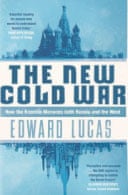 Vladimir Putin cannot win. But Ukraine can. The only questions are when, at what cost, to what extent — and what happens next, says analyst Edward Lucas.
Vladimir Putin cannot win. But Ukraine can. The only questions are when, at what cost, to what extent — and what happens next, says analyst Edward Lucas.
The answer is clear, he and Anne Applebaum told a London event: in the words of Warren Zevon, “send money, guns, and lawyers”. Cash will stabilize Ukraine’s economy. Weapons will bring victory. And lawsuits will cripple the Kremlin’s war machine.
Putin may not survive defeat on the battlefield. But Russia’s kleptocratic, imperialist regime is far more durable than any individual. So the West needs a new Russia strategy ready to deal with many eventualities, he writes for CEPA, including:
- A grindingly slow end to the Putin era, or his rapid departure.
- A seemingly smooth transfer of power, or a disorderly one.
- A desire (however superficial) for rapprochement with the West, or intensified enmity.
- Centrifugal forces tearing Russia apart, or an attempt to re-establish central control by force.
Russia’s kleptocratic, imperialist regime is far more durable than any individual. So the West needs a new Russia strategy, says @cepa‘s @edwardlucas https://t.co/RvFi4tVXf3
— Democracy Digest (@demdigest) October 3, 2022
Because of the Kremlin’s powerful propaganda machine and domination of the information space within Russia, we cannot judge the true level of mass support for Putin or his war, says Robert Person, associate professor of international relations at the U.S. Military Academy and author of the forthcoming Russia’s Grand Strategy in the 21st Century.
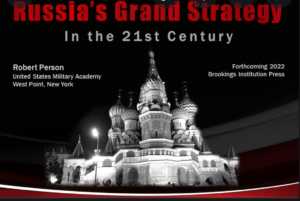 Nor can we know just how close Russians—whether individually or collectively—are to reaching their breaking point and unleashing a revolutionary cascade that could topple Putin’s dictatorial regime, he writes for the Journal of Democracy.
Nor can we know just how close Russians—whether individually or collectively—are to reaching their breaking point and unleashing a revolutionary cascade that could topple Putin’s dictatorial regime, he writes for the Journal of Democracy.
What we do know is that if Putin’s iron grip on Russia is shattered by mass protest one day, it will likely emerge suddenly and unexpectedly but appear inevitable in retrospect. Someday, when students ask how Putin’s Russia collapsed, their professors may well evoke Ernest Hemingway’s classic reflection on bankruptcy: “Two ways. Gradually, then suddenly.”
Russia’s transformational failure
In the early 1990s, the political scientist Claus Offe explained the nature of the unique challenges faced by post-communist states, which he called the triple transformation: the political transition from autocracy to democracy; the economic transition from planned to market economy; and a national transition from empire to nation-building. While post-communist countries saw varying degrees of success, it is the failure to modernize along all three dimensions that distinguishes Russia, former NED Penn Kemble fellow Maria Snegovaya writes for Tablet.
This is no time to go soft on Putin, look for an off-ramp for him, or pressure the Ukrainians to negotiate, argues David J. Kramer, Bradford M. Freeman managing director for global policy at the George W. Bush Institute. Instead, it’s a time to deliver Putin, Putinism, and authoritarianism writ large a massive blow, he writes for The Bulwark:
The Chinese are watching how we respond to this crisis as they weigh a possible invasion of Taiwan. The best way to avert that scenario is to do whatever we can to help the Ukrainians win by driving Russian occupying forces off of Ukrainian territory. The increasingly unhappy Russian people just might take care of the rest.
 Garry Kasparov agrees.
Garry Kasparov agrees.
“Putin is losing in Ukraine and is doubling down on his brutal war in ways that will also lose him Russia,” he tweeted. “Now is the time for Ukraine’s allies to press the advantage and to make this war’s goals loud and clear.”
But comparative studies on the end of autocracies also tell us that the other most likely possibility for a Russia after Putin is simply a different, possibly milder, form of autocracy led by another group of elites, Stanford University’s Kathryn Stoner observes:
It might consist of disgruntled oligarchs, perhaps more interested in ending the war effort by settlement to get access to the properties and assets they acquired over the past two decades that are now under sanction. But there is little reason to think that such a group would be inclined toward giving up the privileges they enjoyed under Putin’s autocracy in favor of a more equitable liberal democracy.
The best case under this scenario would be a less oppressive form of autocracy and perhaps a faster settlement to the Ukrainian conflict, she writes for The Post’s Monkey Cage.
The odds are 3-to-1 in favor of Russia’s personalist autocracy being replaced by another autocracy — just without Putin, @StanfordCDDRL‘s @kath_stoner writes for @washingtonpost‘s @monkeycageblog https://t.co/DX39Z3JhKB
— Democracy Digest (@demdigest) October 3, 2022
“In many ways the country appears to be trapped in a repeating cycle of its history. Twice in the twentieth century, in 1917 and 1991, the autocratic state has broken down, only to be reborn in a different form,” Orlando Figes writes in The Story of Russia.
In a recurring pattern, those forces unleashed by the collapse of state authority proved too weak to sustain a democratic government, Karl Schlögel writes for The FT. Fundamentally little has changed in the systemic asymmetry in the relationship between autocratic rule and society. The external situation is equally bleak.
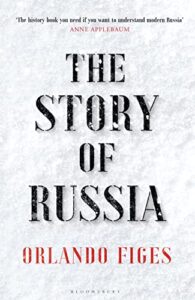 “Isolated from the West, Russia will be forced to pivot east, a turn accelerated by the war and welcomed by a number of the Kremlin’s ideologists, who believe that Russia’s future lies in a Eurasian bloc, opposed to Western liberal values and US global power, with China as its main ally,” writes Figes.
“Isolated from the West, Russia will be forced to pivot east, a turn accelerated by the war and welcomed by a number of the Kremlin’s ideologists, who believe that Russia’s future lies in a Eurasian bloc, opposed to Western liberal values and US global power, with China as its main ally,” writes Figes.
Even when democracy succeeds, it does not emerge overnight in states with no real tradition of it. Years of turmoil often ensue, adds historian Robert D. Kaplan. The 1990s in Russia, following the collapse of the Soviet Union, were a period of rampant crime, economic chaos, and mismanaged reforms that left roughly 70 per cent of Russians living at or below the poverty line. It was from this maelstrom of dysfunctional democracy that Putin finally emerged, he writes for Project Syndicate.
Russia is yet again abandoning the path of modernization, adds former National Endowment for Democracy Penn Kemble fellow Maria Snegovaya. Lacking any internal mechanism to change its trajectory, Russia under its current leadership will likely continue to stagnate and become more isolated, she writes for Tablet.
It is a common refrain among those who worry about Russia’s next moves that Putin cannot lose in Ukraine. But he can and he might, says Lawrence Freedman, Emeritus Professor of War Studies at King’s College London and the author of Command: The Politics of Military Operations From Korea to Ukraine.
A series of terrible decisions has led him to undermine Russia’s international position and economic prospects, shatter the reputation of the Russian Federation as a serious military power, and fail in the most important gamble of his career, he writes for Foreign Affairs. As with all wars, the future course of this one will have unpredictable aspects, but Ukraine, with a clear strategy, better weapons, and committed forces, has seized the initiative. The mobilization he has announced will not turn this around, and the use of nuclear weapons would make a bad situation catastrophic.
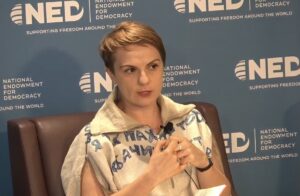 It is imperative for Ukrainians to take back as much territory as possible, adds Nataliya Gumenyuk (right), founder of the Public Interest Journalism Lab. It would help a great deal if Kyiv’s foreign friends were to actually deliver the weapons they have promised. The future depends not just on the bravery of the Ukrainian troops or their intelligence and discipline, but also on how many supplies and materials can be brought to the front, she writes for The Post.
It is imperative for Ukrainians to take back as much territory as possible, adds Nataliya Gumenyuk (right), founder of the Public Interest Journalism Lab. It would help a great deal if Kyiv’s foreign friends were to actually deliver the weapons they have promised. The future depends not just on the bravery of the Ukrainian troops or their intelligence and discipline, but also on how many supplies and materials can be brought to the front, she writes for The Post.
All potential candidates to succeed Putin are implicated in his many violent acts, including his invasion of Ukraine. And on the surface, it seems that each one’s ascension would change little about Russia’s foreign agenda, adds Sergey Radchenko, a Professor at the Johns Hopkins School of Advanced International Studies (SAIS) and a member of the School’s Kissinger Center. But the Kremlin’s power plays rarely involve questions of principle, and successors may well break with the behavior of predecessors when convenient. That means that Putin’s eventual replacement does not have to be invested in his neo-imperialist agenda, he writes for Foreign Affairs.
 Ukraine’s determined resistance to Russia is dismantling the two-frontier trap – one in Europe, the other in the Indo-Pacific – which Russia and China have long hoped to set for the United States, argues Andrew A. Michta, the dean of the College of International and Security Studies at the George C. Marshall European Center for Security Studies.
Ukraine’s determined resistance to Russia is dismantling the two-frontier trap – one in Europe, the other in the Indo-Pacific – which Russia and China have long hoped to set for the United States, argues Andrew A. Michta, the dean of the College of International and Security Studies at the George C. Marshall European Center for Security Studies.
While this aspect of the war has been largely absent in US policy discussions, it needs to be put front and center. What it reveals is that America’s continued support for Ukraine is not a distraction as its “Asia first” critics would have it but, in fact, an intelligent strategy that, at a relatively low cost, is fundamentally shifting the power equation in both Europe and Asia, he writes for 1945.
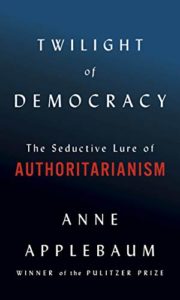 “Support for Putin is eroding — abroad, at home, and in the army,” Anne Applebaum writes in The Atlantic. “Everything else he says and does right now is nothing more than an attempt to halt that decline,” she notes:
“Support for Putin is eroding — abroad, at home, and in the army,” Anne Applebaum writes in The Atlantic. “Everything else he says and does right now is nothing more than an attempt to halt that decline,” she notes:
Over the next few days, the Kremlin’s bogus referendums will gather headlines, and the nuclear threats will create fear, as they were designed to do. But we should understand these attempts at blackmail and intimidation as a part of a deeper story: Support for Putin is eroding—abroad, at home, and in the army. Everything else he says and does right now is nothing more than an attempt to halt that decline.
Rather than fretting about some future craziness, efforts might more usefully be put into preparing for the moment when Putin realises that he has lost and may seek to hold on to Crimea, adds strategist Lawrence Freedman. At this time all the issues connected with ending this war – sanctions, reparations, war crimes, prisoner exchanges, and security guarantees – would need to be addressed.
We may find it difficult to imagine that Putin can lose, and wonder about how well he will cope with his failed aggression, but it is entirely possible that at some point he will run out of options, and have to look failure in the eye, he writes.
All told, while the political strategy behind his new moves is clear, it depends on the credibility of Putin’s threats, adds analyst Mark Galleotti. They run the risk of generating an escalation which is not to the Kremlin’s advantage, and also show no particular battlefield strategy. At best, Putin must be hoping that this allows him to hold the territory he has already taken, which is a pretty good indication that even he knows he is losing, he writes for The Spectator.
Even Putin knows he is losing https://t.co/H5U9YMH2oG via @spectator
— Democracy Digest (@demdigest) September 22, 2022
The Marshall Plan was designed to assist the economic recovery of post-war Europe and to foster the stability needed for their democratic institutions to survive and a recent paper by the German Marshall Fund has put forward proposals to this end, notes analyst Alina Inayeh.
The sustainable reconstruction of Ukraine can be achieved only through good governance that ensures transparency in the design of projects and use of funds, she writes for the GMF. Among the prerequisites for this are a vibrant civil society and a strong media that monitor governmental actions and substantially contribute to limiting Russian malign influence.
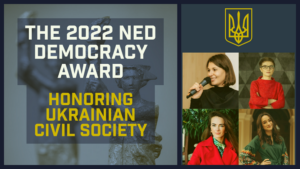 Join Vail Symposium for an in-depth discussion of Ukraine’s journey to democracy. This webinar will include a discussion amongst three strong Ukrainian experts with many years of Ukrainian living, research and understanding. This panel of experts will discuss the current political structure in Ukraine, give their view on the status of the war and share how Russia and the war are impacting Ukraine’s democracy.
Join Vail Symposium for an in-depth discussion of Ukraine’s journey to democracy. This webinar will include a discussion amongst three strong Ukrainian experts with many years of Ukrainian living, research and understanding. This panel of experts will discuss the current political structure in Ukraine, give their view on the status of the war and share how Russia and the war are impacting Ukraine’s democracy.
The Future of Democracy in Ukraine
SERGIY KUDELIA, Associate Professor of Political Science, Baylor University
SAM GREENE, Director for Democratic Resilience, Center for European Policy Analysis
LUCAN AHMAD WAY, Professor, Munk School, University of Toronto
TUESDAY, OCTOBER 13, 2022 6:00 PM Mountain Time RSVP
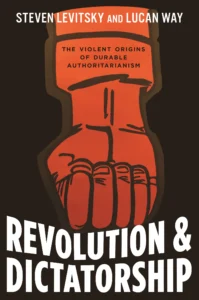 Has the Russian Invasion Strengthened the Liberal World Order?
Has the Russian Invasion Strengthened the Liberal World Order?
Speaker: Lucan Way, University of Toronto
Thursday, November 3, 2022 | 12:00 PM (Pacific)
William J. Perry Conference Room, Encina Hall, Second Floor, Central, C231, 616 Jane Stanford Way, Stanford, CA 94305 RSVP







